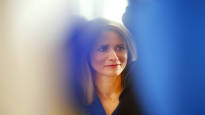Aleksei Fenenko quoted the Prime Minister of Estonia and asked in the discussion program of Rossija 1 channel if Finland is rejecting the Paris Peace Agreement.
Anna Näveri,
Eelis Bjurström
Something strange was heard on a Russian talk show recently.
Visited the Rossija 1 TV channel’s 60 minutes program Alexey Fenenko mixed up the Prime Ministers of Finland and Estonia.
Fenenko invited the Prime Minister of Estonia several times in the program Kaja from Kalla Prime Minister of Finland and, referring to Kallas’ words, ponders whether Finland is abandoning the Paris Peace Treaty signed at the end of the Second World War.
– Now look at these words of the Prime Minister of Finland, Kaja Kallas, that the Russians must repent of their so-called crimes. It is a very serious remark, because until now the Finns have had to repent, Fenenko begins.
Fenenko refers to the Paris Peace Agreement, in which Finland and the other countries allied with Germany, Bulgaria, Italy, Romania and Hungary, were sentenced to, among other things, war reparations and border changes.
– Is Finland about to reject the Paris Peace Agreement? If so, it could revive Northern Europe’s territorial disputes again, says Fenenko.
A peculiar sequence of events is evident from a video clip by a journalist who follows the Russian media at the BBC Francis Scarr shared On Twitter (you will switch to another service).
The video shared by Scarr shows how the host, a propagandist known as “Putin’s Iron Puppet”. Olga Skabeyeva intervenes and corrects Fenenko.
Fenenko is completely silent for a moment, but then continues as if no confusion had happened. In his speech, Fenenko moves on to remind that Finland gave up Petsamo in the peace agreement, among other things.
Fenenko has worked, among other things, at the Russian International Affairs Council (RIAC), a think tank operating under the Russian state.
What thoughts did the story evoke? You can discuss the topic on 19.5. until 11 p.m.
Also listen to Tiedeykkönen’s episode In Russian propaganda, the creation of a large Slavic community has long roots (2022):
